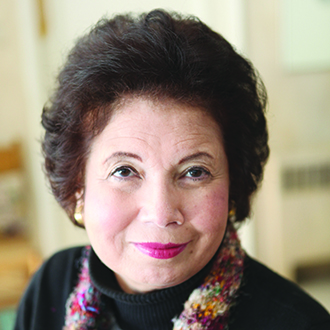Preventing homelessness among the vulnerable working poor has been a major focus for Katonah’s Oscar and Nan Pollock for the past 25 years.
Realizing there are many hardworking families that face temporary financial difficulties they simply do not have the resources to overcome, the couple founded The Bridge Fund of Westchester in 1991, followed by The Bridge Fund of New York the next year. Both are based on an innovative approach — preventing homelessness before it happens.
“Many of the families we help do not qualify for any type of government assistance. They do not meet income qualifications, because they may still be working,” says Oscar, who has spent his career in finance. “This is where we come in. We stabilize working poor households in their existing housing by providing bridge loans to pay their rental arrears, thus preventing eviction. Nearly all of our funding is from private donors, foundations and partnering with other social service agencies, including churches and synagogues. We receive very little government funding.”
AN IDEA IS BORN
The idea for The Bridge Fund was born in 1989 after he and a group of business friends and associates heard a presentation by Karl Bertrand, head of the Coalition for the Homeless in Westchester.
“He suggested the money currently being used for the homeless could be used in a more intelligent fashion,” Oscar says. “He also noted that Westchester County was spending an enormous amount of money on individuals who had been evicted and were then housed in hotels and motels at exorbitant prices.”
“And because there were no kitchens, coupons for meals had to be provided and some children taken back and forth to their original schools by taxi,” adds Nan, a former merchandising director for Seventeen magazine. “The cost was astronomical.”
Oscar says his group was impressed by what they had heard. Bertrand later joined them and said that instead of wasting millions of taxpayer dollars after evictions, donated capital in hand could be used instead to prevent homelessness.
The small group of determined individuals sprang into action and organized a program that soon had a significant effect on Westchester’s homelessness problem.
“As soon as the program got going in Westchester, the numbers of homeless started to drop,” Oscar says. “The program in Westchester remains the only one of its kind here.”
The Westchester program has kept 5,798 families in their homes through the end of 2014. This includes 14,546 individuals and 6,619 children. Total funding to achieve these results was a modest $5,405,649. Westchester numbers to date for 2015 show housing stabilization provided to 620 individuals.
The program model has since been replicated in Bridgeport and Boston.
WHY ON THE BRINK?
The reasons for homelessness in Westchester are all too familiar, Oscar says.
“People might lose a job or may become ill and unable to work; face the desertion of a breadwinner; see a cut in benefits; or a rise in housing costs. The reasons are many but the result is the same. They can no longer pay their rent on time and eventually face an eviction action from their landlord.”
Many of the individuals The Bridge Fund helps have family incomes of only $20,000 to $30,000 per year, right here in affluent Westchester, he adds. Because their jobs are usually low paying, they have little or no savings. If they miss one or two paychecks due to any turn of bad luck, things fall apart very quickly.
“In this case, if they are referred to us, we become their safety net,” Nan says.
Most of The Bridge Fund’s clients live in southern Westchester, but anyone in the county can receive assistance. Clients are referred to The Bridge Fund by a variety of social service agencies, churches and synagogues. “We also work in cooperation with the Westchester County Department of Social Services,” Oscar says.
The maximum amount of funding The Bridge Fund will provide to keep an individual or family in their home is $2,500, usually enough to bring the rent up to date.
“We check our applicants carefully to make sure they have, or are about to have, gainful employment or Social Security benefits and are not burdened by a lot of outside debt, like credit cards,” Nan says. “If more money is needed to pay rental arrears, we will work with other public or private sector groups to put a package together to meet their needs and keep them in their homes. Compare this with the $35,000 to $50,000 per year it costs the county to house a family in a hotel or motel. That is why prevention is so key to our philosophy.”
GOING FOR HELP
Oscar says getting help from The Bridge Fund is simple and direct. “One of our caseworkers conducts an intake interview. We prepare a financial analysis and work with (the family) to develop a monthly budget after the rent is cleared up. We also have a large food pantry in White Plains with a full range of grocery staples donated by Congregation Kol Ami.”
The Bridge Fund also informs clients of all the other benefits and social or legal services for which they are eligible and provides ongoing financial counseling to help them spend their incomes wisely. “We even refer them to free tax preparation services,” Nan says.
The Bridge Fund would help an individual or family more than once if the situation required, Oscar says. “We are flexible and are willing to help clients that, in spite of good intentions, may have just had another round of bad luck.”
All monies provided by The Bridge Fund to stabilize families in their homes are transferred directly to the landlord through a settlement agreement. Clients are asked to pay back the funds they have been given over time and treat the funds as an interest-free loan. “This is a moral, not a legal, commitment,” Oscar says. “A large majority pays back all or part of their loan and we use the funds to help other families in need.”
PREVENTION WORKS
Coming full circle to the beginning of the discussion, Oscar says, “I can’t stress enough how important (prevention) is. We hope that your people will see the simple logic to this. In most cases, there is no reason to spend millions while disrupting families and negatively affecting children by moving them to shelters. The impact of simple prevention is staggering. We are always looking for private contributors who will see the great advantage of what The Bridge Fund is doing.”
Contributions may be sent to Barbara Hayes, CEO, The Bridge Fund of New York Inc., 217 Madison Ave., Suite 907, New York, N.Y. 10016. For more, visit thebridgefund.org.





